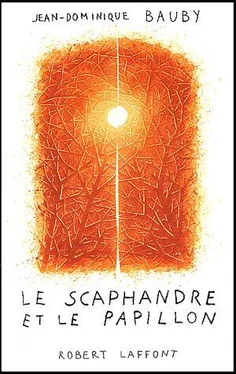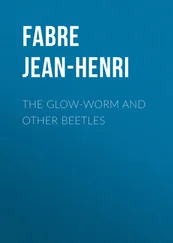The best place to observe this phenomenon is the rehabilitation room, where all patients undergoing physical therapy are congregated. Garish and noisy, a hubbub of splints, artificial limbs, and harnesses of varying complexity, it is an authentic Court of Miracles. Here we see a young man with an earring who suffered multiple fractures in a motorbike accident; a grandmother in a fluorescent nightgown learning to walk after a fall from a stepladder; and a vagrant whose foot was somehow amputated by a subway train. Lined up like a row of onions, this human throng waves arms and legs under minimal supervision, while I lie tethered to an inclined board that is slowly raised to a vertical position. Every morning I spend half an hour suspended this way, frozen to attention in a posture that must evoke the appearance of the Commendatore's statue in the second act of Mozart's Don Giovanni . Below, people laugh, joke, call out. I would like to be part of all this hilarity, but as soon as I direct my one eye toward them, the young man, the grandmother, and the homeless man turn away, feeling the sudden need to study the ceiling smoke detector. The “tourists” must be very worried about fire.
After every day's session on the vertical board, a stretcher bearer wheels me from the rehabilitation room and parks me next to my bed, where I wait for the nurse's aides to swing me back between the sheets. And every day, since by now it is noon, the same stretcher bearer wishes me a resolutely cheerful “ Bon appetit!” —his way of saying “See you tomorrow.” And of course, to wish me a hearty appetite is about the same as saying “Merry Christmas” on August 15 or “Good night” in broad daylight. In the last eight months I have swallowed nothing save a few drops of lemon-flavored water and a half teaspoon of yogurt, which gurgled noisily down my windpipe. The feeding test—as they grandly called this banquet—was not a success. But no call for alarm: I haven't starved. By means of a tube threaded into my stomach, two or three bags of a brownish fluid provide my daily caloric needs. For pleasure, I have to turn to the vivid memory of tastes and smells, an inexhaustible reservoir of sensations. Once, I was a master at recycling leftovers. Now I cultivate the art of simmering memories. You can sit down to a meal at any hour, with no fuss or ceremony. If it's a restaurant, no need to call ahead. If I do the cooking, it is always a success. The bœuf bourguignon is tender, the bœuf en gelée translucent, the apricot pie possesses just the requisite tartness. Depending on my mood, I treat myself to a dozen snails, a plate of Alsatian sausage with sauerkraut, and a bottle of late-vintage golden Gewürztraminer; or else I savor a simple soft-boiled egg with fingers of toast and lightly salted butter. What a banquet! The yolk flows warmly over my palate and down my throat. And indigestion is never a problem. Naturally, I use the finest ingredients: the freshest vegetables, fish straight from the water, the most delicately marbled meat. Everything must be done right. Just to make sure, a friend sent me the recipe for authentic homemade sausage, andouillette de Troyes , with three different kinds of meat braided in strips. Also, I scrupulously observe the rhythm of the seasons. Just now I am cooling my taste buds with melon and red fruit. I leave oysters and game for the autumn—should I feel like eating them, for I am becoming careful, even ascetic, in matters of diet. At the outset of my protracted fast, deprivation sent me constantly to my imaginary larder. I was gluttonous. But today I could almost be content with a good old proletarian hard sausage trussed in netting and suspended permanently from the ceiling in some corner of my head. A knobby Lyons rosette, for example, very dry and coarsely chopped. Every slice melts a little on your tongue before you start chewing to extract all its flavor. The origin of my addiction to sausage goes back forty years. Although still at an age for candy, I already preferred delicatessen meats, and my maternal grandfather's nurse noticed that whenever I visited the gloomy apartment on the Boulevard Raspail, I would ask her in a beguiling lisp for sausage. Skilled at indulging the desires of children and the elderly, she eventually pulled off a double coup, giving me a sausage and marrying my grandfather just before he died. My joy at receiving such a gift was in direct proportion to the annoyance the unexpected nuptials caused my family. I have only the vaguest picture of my grandfather: supine and stern-faced in the gloom, resembling Victor Hugo's portrait on the old five-hundred-franc notes in use at the time. I have a much clearer memory of that sausage lying incongruously among my Dinky Toys and picture books.
The identity badge pinned to Sandrine's white tunic says “Speech Therapist,” but it should read “Guardian Angel.” She is the one who set up the communication code without which I would be cut off from the world. But alas! while most of my friends have adopted the system, here at the hospital only Sandrine and a female psychologist use it. So I usually have the skimpiest arsenal of facial expressions, winks, and nods to ask people to shut the door, loosen a faucet, lower the volume on the TV, or fluff up a pillow. I do not succeed every time. As the weeks go by, this forced solitude has allowed me to acquire a certain stoicism and to realize that the hospital staff are of two kinds: the majority, who would not dream of leaving the room without first attempting to decipher my SOS messages; and the less conscientious minority, who make their getaway pretending not to notice my distress signals. Like that heartless oaf who switched off the Bordeaux-Munich soccer game at halftime, saying “Good night!” with a finality that left no hope of appeal. Quite apart from the practical drawbacks, this inability to communicate is somewhat wearing. Which explains the gratification I feel twice daily when Sandrine knocks, pokes her small chipmunk face through the door, and at once sends all gloomy thoughts packing. The invisible and eternally imprisoning diving bell seems less oppressive.
Speech therapy is an art that deserves to be more widely known. You cannot imagine the acrobatics your tongue mechanically performs in order to produce all the sounds of a language. Just now I am struggling with the letter l, a pitiful admission for an editor in chief who cannot even pronounce the name of his own magazine! On good days, between coughing fits, I muster enough energy and wind to be able to puff out one or two phonemes. On my birthday, Sandrine managed to get me to pronounce the whole alphabet more or less intelligibly. I could not have had a better present. It was as if those twenty-six letters had been wrenched from the void; my own hoarse voice seemed to emanate from a far-off country. The exhausting exercise left me feeling like a caveman discovering language for the first time. Sometimes the phone interrupts our work, and I take advantage of Sandrine's presence to be in touch with loved ones, to intercept and catch passing fragments of life, the way you catch a butterfly. My daughter, Céleste, tells me of her adventures with her pony. In five months she will be nine. My father tells me how hard it is to stay on his feet. He is fighting undaunted through his ninety-third year. These two are the outer links of the chain of love that surrounds and protects me. I often wonder about the effect of these one-way conversations on those at the other end of the line. I am overwhelmed by them. How dearly I would love to be able to respond with something other than silence to these tender calls. I know that some of them find it unbearable. Sweet Florence refuses to speak to me unless I first breathe noisily into the receiver that Sandrine holds glued to my ear. “Are you there, Jean-Do?” she asks anxiously over the air.
Читать дальше












